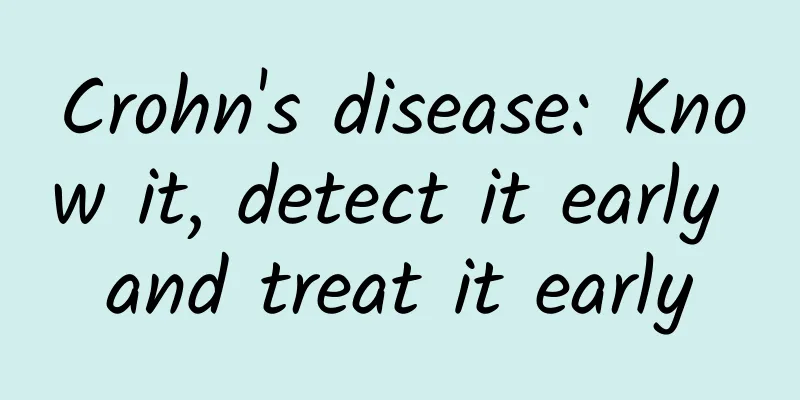Crohn's disease: Know it, detect it early and treat it early

|
Recently, British media reported that Princess Kate was suspected of suffering from Crohn's disease. This news has brought Crohn's disease back into the public eye. Crohn's disease, known as the "immortal cancer" and "green cancer", has once again attracted public attention. So, what exactly is Crohn's disease? What are its symptoms that we need to be alert to? Crohn's disease is a chronic nonspecific gastrointestinal inflammatory disease, a type of inflammatory bowel disease (IBD). In recent years, the incidence of Crohn's disease in China has shown a significant upward trend, and the trend of younger patients is obvious. Crohn's disease is more common in young adults aged 15 to 45, with similar prevalence rates in men and women. The disease is mostly found in the terminal ileum and ascending colon, but can also occur in any part of the entire digestive tract. Its symptoms are diverse, including digestive system symptoms such as diarrhea, abdominal pain, and abdominal mass, as well as systemic symptoms such as fever, loss of appetite, weight loss, and malnutrition. In addition, Crohn's disease may also cause extraintestinal symptoms such as arthritis, conjunctivitis, and skin and oral mucosal damage. Crohn's disease is incurable, has many complications, a high recurrence rate, and a high risk of cancer. If it is not treated actively, the disease cannot be effectively controlled and may cause severe conditions such as gastrointestinal bleeding, acute intestinal perforation, intestinal obstruction, and even life-threatening. Therefore, early detection and early treatment are critical to controlling Crohn's disease. However, Crohn's disease is a disease that is easily missed or misdiagnosed. Since the early symptoms are not obvious, it is easy to be ignored or treated as ordinary enteritis or appendicitis, resulting in delayed treatment and irreversible consequences. Therefore, when the body has digestive system symptoms such as diarrhea, abdominal pain, abdominal mass, and systemic symptoms such as fever, loss of appetite, and weight loss, it should be vigilant and go to the hospital to see a professional IBD doctor for examination in time. For the treatment of Crohn's disease, drug therapy is currently used to control disease activity and maintain disease remission. Commonly used drugs include aminosalicylic acid preparations, glucocorticoids, immunosuppressants, etc. However, it should be noted that Crohn's disease is a lifelong disease that requires long-term treatment and management. Patients need to go to the hospital for regular review and follow-up in order to adjust the treatment plan in time and monitor changes in the condition. In addition to drug treatment, some patients with severe Crohn's disease may need surgical treatment. The main purpose of surgery is to remove the severely diseased intestine to prevent further deterioration of the disease. However, surgery cannot cure Crohn's disease, and patients still need to continue to receive drug treatment and regular follow-up after surgery. In addition to treatment, prevention of Crohn's disease is equally important. Doctors remind that regular living, abstaining from raw, cold, or unclean food, proper physical exercise, mental conditioning, and keeping a calm and happy mood can all help prevent the occurrence of Crohn's disease. In addition, for people with a family history of Crohn's disease, regular intestinal examinations are also an important means of preventing Crohn's disease. In short, Crohn's disease is a chronic nonspecific gastrointestinal inflammatory disease with the characteristics of being incurable, having many complications, high recurrence rate, and high risk of cancer. We need to be vigilant and seek medical attention in time when relevant symptoms appear. At the same time, we can prevent the occurrence of Crohn's disease through good living habits and regular intestinal examinations. Only in this way can we better protect our health. |
<<: The 25th National Ear Care Day丨Tinnitus is not necessarily an ear disease
>>: Are you troubled by thyroid nodules?
Recommend
How is pelvic effusion formed?
Pelvic hydrops, also known as pelvic effusion, is...
Will tooth extraction delay menstruation?
Many women experience delayed menstruation. If th...
What are the precautions for female endocrine disorders?
Endocrine is particularly important to the body. ...
What to do if your stratum corneum is thin and your skin is dry? Six ways to improve your stratum corneum
Many people think that thin stratum corneum is dif...
What are the characteristics of tulips? What does it mean to give tulips as gifts?
Tulips have large, upright cup-shaped flowers in ...
Is it okay for girls to drink water before going to bed?
Many people like to drink a glass of water before...
Can I apply the plaster during menstruation?
During the menstrual period, women's physical...
Can I swim on the second day of my period?
In our lives, many people like swimming, because ...
Is it normal to have a fever during early pregnancy?
During pregnancy, the human body will undergo man...
What causes shortness of breath during pregnancy?
Many pregnant women will experience many symptoms...
TCM Dialectical Treatment of Ovarian Cyst
Women's estrogen needs to be secreted through...
Is moderate cervical erosion serious?
Cervical erosion is a very common gynecological d...
When is the safe period? Young women should remember
Many women who have not yet considered having chi...
Is right ovarian cyst serious? Authoritative experts tell you the answer!
Ovarian cysts are very harmful to the heart. Some...
Does pelvic inflammatory disease cause nausea and vomiting?
Pelvic inflammatory disease can be said to be the...









